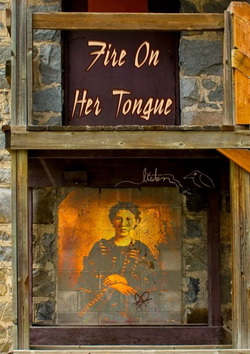
|
Taking It With You: A Review of Fire On Her Tongue “Poetry movements have often been accompanied by anthologies that serve as manifestoes,” writes Robert Atwan in his forward to The Best American Essays, 2011. However, Fire On Her Tongue: An eBook Anthology of Contemporary Women’s Poetry, edited by Kelli Russell Agodon and Annette Spaulding-Convy, is no manifesto. Women have been writing about their lives even while poetry movements were taking place, even when they were not part of any movement. The poems in Fire On Her Tongue reflect the different subjects contemporary women poets are undertaking while still focusing on what it means to be a woman and live a woman’s life. These poems bring important subjects to light but don’t favor any certain form or aesthetic. I was afraid, since I am a poet myself, that I might have a problem with reading poetry in an electronic format. Would I be able to adjust the font enough so I wouldn’t change the poetic line as it should be read? Once I started reading, these problems fell away. This is an engaging anthology, filled with voices that knocked me out of my seat. Readers are sure to find poets they already admire among these pages as well as new ones they may not be familiar with. I can’t do justice to everyone in this anthology, as there were so many poems I loved. But I want to share a few of the poets who are new to me, because I think this is one of the best reasons to read contemporary anthologies. I start with Madeline DeFrees’ excerpts from Whaling Wives: “Desire Hathaway”: The crew is another matter, the men And I do not need the ship’s glass to show me / clearly rough seas ahead. There are other poems in this sequence that give us a taste of what this life might have been like, a world that doesn’t exist any longer and is difficult to imagine, which is what I admire about DeFrees’ work. I’m taken a different place and time. In Patricia Fargnoli’s poems, I’m also taken to a different place, but it’s a different kind: the place of watching time pass. In “Seventy –Two, Mid-Winter,” we find a speaker plagued by dreams: Yesterday, she was ill, a fleeting illness, but hard and Where is her safety now? Life for her more and more Tina Kelley’s poem “Done Procreating” is another poem about aging, but, at the same time, moving toward another stage. Even though the speaker is leaving one part of her life behind, she’s also thinking ahead to the future, of what’s in store: With this new beginning, there’s a certain end to things. and I’ll never do a handstand while nine months Maybe my choices of what I’ve shared here reveal my aesthetic or where I am in my life. But that’s the beauty of Fire On Her Tongue: I’ve found poems that speak to me as a reader and a writer. I’ve found poets whose subject matter and use of form I admire. There’s so much to admire about this book, and as readers, we’re lucky to have these small bits of inspiration to walk us through our lives. As poets, we have new voices to listen to, new forms to imitate, and new ways to be inspired. And we can take these with us, wherever we go. Julie Brooks Barbour is the author of the chapbook Come To Me and Drink (Finishing Line Press, 2012). Her poems have appeared in UCity Review, Waccamaw, Kestrel, Diode, damselfly press, Referential Magazine, Prime Number Magazine, Taos Journal of Poetry & Art, and on Verse Daily. She teaches at Lake Superior State University where she edits the journal Border Crossing. Also by Julie Brooks Barbour: |
